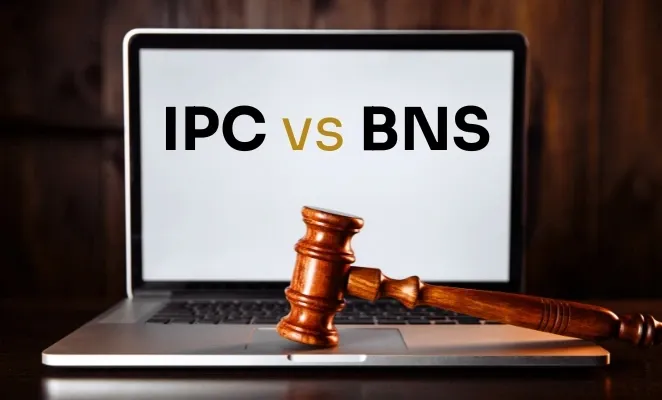The Bharatiya Nyaya Sanhita, 2023 vs IPC: What Law Students Must Know

The Bharatiya Nyaya Sanhita (BNS), 2023 marks a historic and transformative development in India's criminal law. Enacted on December 25, 2023, and effective July 1, 2024, the BNS replaces the nearly century-and-a-half-old Indian Penal Code (IPC) of 1860. For law students, understanding the nuances of this new legal framework is crucial, given its implications on criminal justice, legal education, and practical application.
Background and Objectives of the Bharatiya Nyaya Sanhita
The IPC had been the core criminal statute in India since colonial times, but critics argued it was outdated, overly complex, and insufficient for addressing modern legal challenges. The BNS aims to consolidate, modernize, and streamline criminal law by simplifying language, reorganizing provisions, and introducing new offences and punishments aligned with contemporary realities.
Key objectives of the BNS include:
- Replacing IPC’s scattered provisions with a more accessible and cohesive code of 358 sections across 20 chapters.
- Incorporating offences that reflect present-day challenges such as cybercrime, organized crime, environmental offences, and financial fraud.
- Introducing fresh punishments like mandatory minimum sentences, community service, and enhanced penalties to balance justice and deterrence.
- Removing colonial-era offences like sedition and decriminalizing suicide attempts.
- Promoting a justice-oriented system rather than solely punishment-focused.
Structural and Content Changes Compared to IPC
While the BNS preserves the broad structure familiar to law students, the number of sections is reduced from 511 (IPC) to 358 (BNS), with chapters better organized, thematically. For example, offences against women and children, previously scattered, now have a dedicated chapter (Chapter 5). Similarly, offences affecting the human body are consolidated in Chapter 6.
Important structural changes include:
- Merging incomplete offences such as abetment, attempt, and conspiracy into a single chapter for clarity.
- Definitions and punishments are often provided within the same section, streamlining reference.
- New offences explicitly include mob lynching, petty organized crime, abetment of offences committed abroad, and cyberspace offenses.
- Offences involving public tranquillity, election malpractices, and false evidence feature prominently but with clearer language.
Key Substantive Differences Law Students Should Note
Offences Against the State
Significantly, the BNS omits sedition as an offence, replacing it with a broader and less ambiguous provision covering acts endangering India’s sovereignty, unity, and integrity. This change is likely to affect how freedom of speech and dissent are balanced legally.
Sexual Offences
The BNS retains most IPC offences relating to sexual crimes but raises the age threshold from 16 to 18 years for certain offences like gang rape victims. It introduces stricter punishments for sexual offences but retains certain controversial provisions such as the marital rape exception and the phrase "outraging the modesty of women," criticized for lacking gender neutrality.
Punishments and Sentencing
The BNS introduces mandatory minimum sentences for 23 offences and community service orders in 6 offences, emphasizing on restorative justice and rehabilitation. It increases imprisonment terms and fines for many offences compared to the IPC. Unlike IPC, the BNS specifically enhances penalties for environmentally harmful actions and financial frauds to meet modern regulatory needs.
New and Removed Offences
Among the new offences are:
- Organized crime and petty organized crime with targeted penalties.
- Cybercrimes and financial fraud, reflecting the digital age’s challenges.
- Environmental pollution and human trafficking, to protect public health and morality.
Offences that the BNS excludes but were present in IPC include:
- Sedition (Section 124A IPC).
- Attempted suicide (Section 309 IPC) is no longer punishable.
- Certain outdated or colonial-era offences.
Criticisms and Challenges
Despite modernization, the BNS faces criticisms:
- Retention of marital rape exemption and gender-biased language.
- Insufficient protection for victims of non-consensual intimate imagery.
- Ambiguity in provisions concerning acts threatening sovereignty, with potential misuse to curtail dissent.
- Concerns about whether the justice-oriented aims truly translate into practice.
Some legal experts stress that the BNS’s real impact will depend on judicial interpretation and implementation by law enforcement agencies.
What Law Students Must Focus On
For students preparing for exams, moot courts, and legal practice, key takeaways include:
- Familiarize Thoroughly with BNS Structure and Sections: The reorganization means familiar IPC sections may have different numbering or be consolidated. Mastery over the new layout is important for legal research and arguments.
- Understand the New Offences and Penal Philosophy: Awareness of offences added, removed, or modified under the BNS will help in critically analyzing criminal law’s evolving scope.
- Focus on Changes to Sexual Offences and Offences Against the State: These are sensitive areas with significant societal impact.
- Track the Enhanced Punishments and Introduction of Community Service: Knowing sentencing changes aids understanding of judicial trends.
- Critically Assess Social and Legal Implications: Engage with scholarly critiques on gender issues, freedom of expression, and victim protections to appreciate the law’s social dimensions.
Conclusion
The Bharatiya Nyaya Sanhita, 2023 represents a major step in India's legal evolution, aiming to modernize centuries-old criminal law while addressing contemporary crime and justice needs. Law students must adapt to this shift by studying the Sanhita closely, comparing it with the IPC, and evaluating its provisions critically. Doing so will prepare them for future roles as legal professionals, educators, and policymakers shaping India’s justice system.
Understanding both the progressive elements and limitations of the BNS is essential for a holistic grasp of Indian criminal law in the 21st century.




